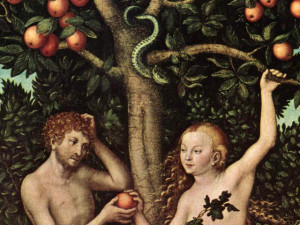 According to the Book of Genesis, after God created the first human beings, Adam and then Eve, he issued a specific command that they should not eat from “the tree of the knowledge of good and evil” (Genesis 2.17a). And he affixed to this command a sanction that should they disobey the command, then on that day they would “surely die” (Genesis 2.17b). The narrative then goes on to tell the story of how Eve, tempted by a speaking serpent, chose to disobey God’s command by eating of the fruit of the tree of the knowledge of good and evil (Genesis 3.1-6a). Moreover, we are told that Eve gave of the fruit to Adam, and he too then ate and thus disobeyed God’s command as well (Genesis 3.6b). Continue reading
According to the Book of Genesis, after God created the first human beings, Adam and then Eve, he issued a specific command that they should not eat from “the tree of the knowledge of good and evil” (Genesis 2.17a). And he affixed to this command a sanction that should they disobey the command, then on that day they would “surely die” (Genesis 2.17b). The narrative then goes on to tell the story of how Eve, tempted by a speaking serpent, chose to disobey God’s command by eating of the fruit of the tree of the knowledge of good and evil (Genesis 3.1-6a). Moreover, we are told that Eve gave of the fruit to Adam, and he too then ate and thus disobeyed God’s command as well (Genesis 3.6b). Continue reading
Tag Archives: Original Sin
The Myth of Original Sin
The doctrine of original sin says that as a result of Adam’s sin all of Adam’s posterity besides Jesus are born with a “sinful nature,” whereby they are physically unable to do anything but sin; they cannot do good. For example, the Catechism of the Catholic Church states, “By yielding to the tempter, Adam and Eve committed a personal sin, but this sin affected the human nature that they would then transmit in a fallen state.”
Calvinist and other Reformed churches add to this a second element, namely, all of Adam’s posterity besides Jesus are from the moment of Adam’s sin-so even before they are born-regarded by God as guilty of Adam’s sin. Not only is Adam guilty for the sin, in other words, but everyone is deemed by God to be guilty of the sin. Thus, the Westminster Confession of Faith states, “They [Adam and Eve, "our first parents"] being the root of all mankind, the guilt of this sin was imputed; and the same death in sin, and corrupted nature, conveyed to all their posterity descending from them by ordinary generation.”
Is any of this true? Well, what’s the evidence? Does revelation teach it? Does philosophical reasoning teach it? Continue reading